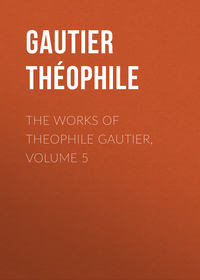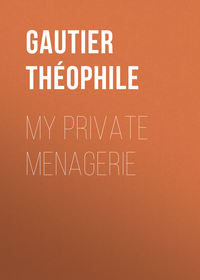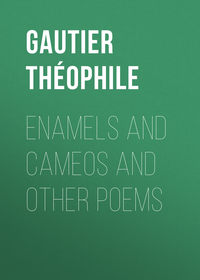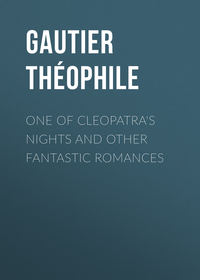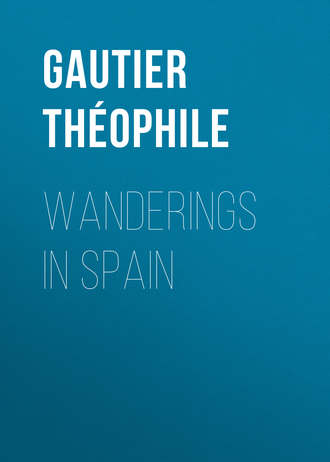 полная версия
полная версияWanderings in Spain
The aspect of Gibraltar completely confuses all your ideas: you no longer know where you are, nor what you see. Just fancy an immense rock, or, rather, a mountain, fifteen hundred feet high, rising suddenly and bluffly from the midst of the waves, and based on a tract of ground so flat and level that you can scarcely perceive it. Nothing prepares you for it, nothing accounts for its being there; it is connected with no chain of mountains; but it is a monstrous monolith thrown down from heaven, the corner of some planet broken off during a battle of the stars – a fragment of some broken world. Who placed it in this position? God and Eternity alone know. What adds still more to the singular effect of this inexplicable rock is its form. It looks like an enormous, prodigious, and gigantic Sphinx, such as Titans might have sculptured, and compared to which, the flat-nosed monsters of Carnac and Giseh are but what a mouse is in comparison with an elephant. The outspread paws form what is called Europa Point; the head, which is somewhat truncated, is turned towards Africa, which it seems to look at with profound and dreamy attention. What thoughts can this mountain be revolving in its mind, in this sly meditative attitude? What enigma is it about to propose, or endeavouring to solve? The shoulders, loins, and hind-quarters stretch towards Spain in nonchalant folds and beautifully undulating lines, like those of a lion in a state of repose. The town is situated at the bottom of the rock, and is almost imperceptible, being a wretched detail lost in the general mass. The three-deckers at anchor in the bay look like German toys – little miniature models of ships, such as are sold in seaport towns – and the smaller craft seem to be flies drowning in milk; even the fortifications are not apparent. The mountain, however, is hollowed out, mined and excavated in every direction; its belly is full of cannons, howitzers, and mortars; it is absolutely crammed with warlike stores. It is an example of the luxury and coquetry of the Impregnables. But all this offers nothing to the eye, save a few almost imperceptible lines, which are confounded with the wrinkles on the face of the rock, and a few holes through which pieces of artillery furtively thrust their brazen mouths. In the Middle Ages, Gibraltar would have bristled with donjons, towers, turrets, and battlements; instead of taking up its position below, the fortress would have scaled the mountain, and perched itself, like an eagle's nest, upon the highest peak. The present batteries sweep the sea, which is so narrow in this part, and render it almost impossible for a vessel to force a passage. Gibraltar was called by the Arabs, Giblaltah, – that is to say, the Mountain of the Entrance; and never was a name more appropriate. Its ancient name was Calpe. Abyla, now Ape's Hill, is on the other side of the straits in Africa, close to Ceuta, a Spanish possession, the Brest and Toulon of the Peninsula; it is there that the Spaniards send their most hardened galley-slaves. We could distinctly make out its rocky precipices, and its crest enveloped in clouds, despite the serenity of the surrounding sky.
Like Cadiz, Gibraltar, situated on a peninsula at the entrance of a gulf, is only connected with the continent by a narrow strip of land called the Neutral Ground, where the custom-house lines are established. The first Spanish possession on this side is San Roque. Algeciras, whose white houses glisten in the universal azure, like the silvery stomach of a fish floating on the surface of the water, is exactly opposite Gibraltar; in the midst of this splendid blue, Algeciras was having its little revolution. We heard indistinctly the popping report of fire-arms, like the noise made by grains of salt when thrown into the fire. The ayuntamiento even took refuge on board the steamer, and began smoking cigars in the most tranquil manner in the world.
The officers of health not having found that we brought any infectious disease with us, we were surrounded by small boats, and, in another quarter-of-an-hour, we were on shore. The effect produced by the appearance of the town is the strangest it is possible to conceive. By taking one step, you have your five hundred leagues, which is rather more than even Tom Thumb did in his famous boots. Just now you were in Andalusia, at the next moment you are in England. From the Moorish towns of Granada and Murcia, you suddenly alight at Ramsgate: you see brick-houses with their areas, their low doors, and their English windows, exactly like those at Twickenham or Richmond. If you go a little further, you will perceive cottages with their painted railings and gates. The public walks are planted with ash and birch trees, with elms and the green vegetation of the north, so different from those small plates of varnished metal which pass for foliage in southern climates. Englishmen have so strong an individuality that they are everywhere the same, and I really cannot understand why they travel, for they carry all their customs with them, and bear their houses on their backs exactly like snails. Wherever an Englishman may be, he lives precisely as he would do in London; he must have his tea, his rumpsteaks, his rhubarb pies, his porter, and his sherry, if he is well; and his calomel, if he is ill. By means of the innumerable packages he lugs about with him, the Englishman always enjoys his home and his comfort, which are necessary to his existence. How many objects do our insular neighbours require in order to live – how much trouble do they give themselves to feel at their ease? – and how much do I prefer to all this complicated array, Spanish abstemiousness and privation! It was a very long time since I had seen a female with one of those horrible coal-scuttle affairs, one of those odious pasteboard cases covered with a slip of stuff, and called bonnets, in which the fair sex bury their faces, in so-styled civilized countries. I cannot express the disagreeable sensation I experienced at the sight of the first Englishwoman I met, with a bonnet and a green veil on her head; I seemed, all at once, to be placed face to face with the spectre of civilization, that mortal enemy of mine, and this apparition struck me as a sort of warning that my dream of vagabond liberty was at an end, and that I should soon be obliged once more to re-enter the mode of life of the nineteenth century, never to leave it again. Before this Englishwoman, I felt quite ashamed of having neither white kid gloves, eye-glass, nor patent leather shoes, and I cast an embarrassed glance on the extravagant embroidery of my sky-blue mantle. For the first time during six months, I felt that I was not presentable, and that I did not look like a gentleman.
At Gibraltar, which has become heretic since the English occupy it, there are a great number of Jews, who have either been driven away, or looked on with an evil eye by the Spanish, who, if they have no more religion, still possess superstition. They walk about the streets, displaying their hooked noses, thin lips, and yellow, polished foreheads surmounted by rabbinical caps, placed on the back of the head, and their threadbare, narrow, sombre-coloured robes. The Jewesses, who, by a singular privilege, are as beautiful as their husbands are hideous, wear picturesque black cloaks, bordered with scarlet and having hoods. Their appearance caused us to think vaguely of the Bible, of Rachel at the well, and the primitive scenes of the time of the patriarchs, for, like the women of all oriental races, they still preserve in their long black eyes and the golden tints of their complexions, the mysterious reflexion of a world that has now disappeared. There are, also, at Gibraltar, a great many natives of Morocco, as well as Arabs from Tangiers and the places along the coast: they have little shops, where they sell perfumery, silk sashes, slippers, fly-flappers, ornamented leathern cushions, and other knick-knacks of barbarous industry. As we wished to purchase a few trifles and curiosities, we were conducted to one of the principal dealers, who lived in the upper part of the town. We had to pass through a number of streets like staircases, which were less English in their character than the streets in the lower part of the town, and whence, at certain turnings, our eye glanced over the gulf of Algeciras, which was magnificently illuminated by the last rays of daylight. On entering the Morocco merchant's house, we were enveloped in a cloud of oriental perfumes: the sweet, penetrating odour of rose-water greeted our olfactory organs and made us think of the mysteries of the harem and the marvels of the Thousand-and-One Nights. The merchant's sons, two fine young men about twenty years of age, were seated on benches near the door, enjoying the coolness of the evening. They possessed that purity of features, that limpidity of look, that careless nobleness, and that air of amorous and pensive melancholy which belong to pure races. Their father had the grave, majestic look of a Magian king. We considered ourselves very ugly and mean-looking by the side of this solemn personage; and it was in the most humble tone, with hat in hand, that we asked him if he would deign to sell us a few pairs of yellow morocco slippers. He nodded affirmatively, and, on our observing that the price was rather high, he replied in Spanish, with great grandeur, "I never overcharge; such practices are only good for Christians." Thus our want of loyalty in commercial transactions renders us an object of contempt in the eyes of barbarous nations, who cannot understand that a man will perjure himself, in order to make a farthing or two more.
Having made our purchases, we went down again to the lower part of the rock, and took a stroll along a fine promenade planted with trees of northern climes, intermixed with flowers, sentinels, and guns, and where you meet with broughams and horsemen just as you do in Hyde Park. All that is wanting there is the statue of Achilles Wellington. This promenade is outside the town, at Europa Point, in the direction of the mountain inhabited by the monkeys. This is the only spot in Europe where these amiable quadrumanes live and multiply in a savage state. According as the wind changes, they pass from one side of the rock to the other, and thus serve as a barometer: every one is forbidden to kill them under very heavy penalties. As for myself, I saw none; but the temperature of the place is hot enough to allow the most chilly macacuses and cercopithecuses to fully develop themselves, without fires or air-stoves. Abyla, if we can believe its modern name, must delight, on the coast of Africa, in a similar population.
The next day we left this park of artillery and land of smuggling, to be wafted towards Malaga, with which place we were already acquainted, but which we had great pleasure in again beholding, with its white, slender lighthouse, and its harbour full of perpetual movement. Viewed from the sea, the cathedral looks larger than the town, and the ruins of the ancient Arab fortifications impart to the sloping rocks a most romantic effect. We returned to our inn of the Three Kings, and the pretty Dolores uttered a cry of joy on recognising us.
The next day we again embarked with a cargo of raisins; and, as we had lost some time, the captain resolved to pass by Ameria, and to go direct to Cartagena.
We kept close enough to the coast of Spain never to lose sight of it; but the coast of Africa had, in consequence of the widening of the Mediterranean, long since disappeared from the horizon. On one side, therefore, our view consisted of long rows of bluish cliffs, with curiously-formed steeps, full of perpendicular cracks, and marked, here and there, with white spots, announcing the presence of a little village, a watch-tower, or a custom-house officer's hut; and, on the other, of the boundless sea, now ruffled and goffered by the breeze or tide, now of a dull blue and dead colour, or as transparent as crystal, and then brilliant and undulating, like the basquina of a dancing-girl, while at other times it was opaque, oily, and as grey as mercury or melted lead; forming altogether a variety of tones, and assuming such various aspects as would throw any poet or painter into utter despair. A procession of red, white, and other light-coloured sails, of ships of every size and nation, enlivened the scene, and took away that melancholy which ever attends infinite solitude. A sea in which no sail is visible, is the most sad and dispiriting spectacle that any one can well behold. Fancy not one thought on so large an extent of space, not one soul to comprehend all the sublimity contained therein! And yet, only place one white and almost imperceptible speck on this fathomless and unbounded main, and its immensity will be peopled; it will then contain an interest, a drama.
Cartagena, which is called Cartagena de Levante, to distinguish it from Cartagena in America, is situated at the end of a bay, a sort of funnel of rocks, where ships find complete shelter from every wind. Its form has nothing picturesque about it; the deepest impressions produced on us there were made by two windmills, decorated with black drawings on a light sky-blue ground.
The aspect of Cartagena differs entirely from that of Malaga. Buried in its crown of bare and sterile rocks, which are as dry as the Egyptian hills of the ancient Pharaohs, Cartagena is as dull and grim as Malaga is gay, cheerful, and animated. You no longer see whitewashed walls, for they are all dark-coloured, and the windows are grated with a complication of iron-work; while the houses, still more ill-looking, possess that prison-like appearance which distinguishes all Castilian mansions. Yet, as we do not wish to fall into the error of that traveller who wrote in his note-book, "All the women at Calais are cross, red-haired, and hump-backed," because the landlady of his inn united in herself these three defects, we must own that we perceived at these barred windows none but charming features and angelic faces: it is perhaps on this account that they are grated so carefully. While waiting for dinner, we went to visit the naval arsenal, an establishment of the grandest proportions, but at present in a state of grievous dilapidation; its vast basins, its stocks and idle dockyards, in which another armada might be built, are used for nothing now. Two or three half-constructed hulls, looking like the stranded skeletons of so many cachelots, are rotting unheeded in a corner; thousands of crickets have taken possession of those large deserted vessels, and you cannot make a step without crushing some of them; the noise they make, too, with their little rattles, is so great, that you can hardly hear yourself speak. In spite of the love I profess to have for crickets, love which I have expressed both in prose and verse, I must frankly own that here there were somewhat too many for me.
From Cartagena, we went as far as the town of Alicant, of which I had mentally formed, from a verse in the Orientale of Victor Hugo, a much too denticulated sketch:
"Alicante aux clochers mêle les minarets."Now, Alicant would have much difficulty, at present at least, in bringing about this mixture, which I acknowledge as very desirable and picturesque, seeing, in the first place, that it has no minarets, and that the only steeple it possesses is a very low and far from important tower. What characterizes Alicant is an enormous rock, which rises in the middle of the town; and this rock, of a magnificent form and colour, is crowned with a fortress, and flanked with a watch-tower that was suspended over the abyss in the most audacious manner. The town-hall, or, to keep up the local colour, the palace of the Constitucion, is a delightful edifice, constructed in the best possible taste. The Alameda, paved throughout with stone, is shaded by two or three rows of trees, pretty well supplied with leaves for Spanish trees, of which the roots do not revel in a well. The houses rise high, and assume European forms. I saw two women wearing yellow brimstone-coloured bonnets – a menacing symptom. This is all I know of Alicant, where the boat only remained long enough to take in some freight and coal, and we profited by this stoppage to go and breakfast on shore. As may be imagined, we did not neglect the opportunity of making some conscientious experiments on the wine, which in spite of its incontestable authenticity, I did not find so good as I thought I should: this perhaps arose from the taste of pepper which had been imparted to it by the bota in which it was contained. Our next stage was to take us to Valencia, Valencia del Cid, as the Spaniards say.
From Alicant to Valencia, the cliffs along the shore continue to rise in curious forms, and to assume unexpected appearances: our attention was called to the summit of a mountain, where there was a square chasm, which seemed as if it had been cut out by the hand of man. Towards morning, on the following day, we cast anchor before the Grao; this is the name given to the harbour and suburb of Valencia, which is at half a league's distance from the sea. The waves ran high, and when we arrived at the landing-place, we were pretty well sprinkled with sea water. There we took a tartan to go to the town. The word tartan is generally taken in a maritime sense; but the tartan of Valencia is a case covered with oil-cloth, and placed on two wheels, without any springs whatever. This vehicle, compared to the galeras, seemed effeminately luxurious to us; and no fashionably-made carriage ever appeared more soft. We were quite surprised and embarrassed at being so comfortable. Large trees bordered our route, affording us a pleasure to which we had not been accustomed for some time.
With regard to picturesque appearance, Valencia corresponds pretty well with the notion formed of it from romances and chronicles. It is a large, flat, scattered town, laid out in a confused manner, and possesses none of those advantages that disorder in construction imparts to old towns built on hilly sites. Valencia is situated in a plain named the Huerta, in the midst of gardens and cultivated lands, where constant irrigation keeps everything cool and fresh – a very rare circumstance in Spain. The climate is so mild, that palm-trees and orange-trees grow in the open air by the side of products of the north. Valencia, therefore, carries on a great trade in oranges, which are measured by being passed through a ring, like cannon-balls when calibre is required to be known. Those which cannot pass constitute the choicest. The Guadalaviar, over which are five handsome stone bridges, and which is bordered by a superb promenade, runs by the side of the city, nearly beneath the ramparts. The frequent use made of its waters for irrigation render these five bridges mere objects of ornament for three-fourths of the year. The gate of the Cid, through which you pass to go to the promenade of the Guadalaviar, is flanked with large embattled towers, which produce a pretty good effect.
The streets of Valencia are narrow, and bordered with high houses of a sullen aspect, some of which still bear mutilated coats of arms; you can also perceive fragments of worn-out sculptures, chimeras without claws, women without noses, and knights without arms. A casement in the style of the Renaissance, but which is lost and imbedded in a frightful wall of recent workmanship, causes from time to time an artist to raise his eyes, and utter a sigh of regret; you must, however, look for such rare vestiges in obscure corners, and at the bottom of back-courts, for Valencia itself has quite a modern aspect. The cathedral, built in a style of hybrid architecture, possesses nothing, in spite of an apsis with a gallery furnished with Roman semicircular arches, which can attract the attention of the traveller after the wonders of Burgos, Toledo, and Seville. A few finely-sculptured altar-screens, a painting by Sebastian del Piombo, and another by Espagnoletto, executed in his softest style, when he was trying to imitate Correggio, are the only things worthy of remark. The other churches, though both numerous and rich, are built and decorated in that strange style of bad ornamentation of which we have already given a description several times. On beholding all these extravagances, you can but regret so much talent should have been thrown away on such subjects. La Longa de Seda (purse of silk) on the market-place, is a delightful Gothic monument; the grand hall, the vaulted roof of which rests on rows of pillars with wreathed nervures of extreme lightness, presents an appearance of elegance and sprightliness rarely met with in Gothic architecture, which is in general more fitted to express melancholy than happiness. It is in the Longa that the fêtes and masked balls of the carnival take place. Before we have done speaking of the monumental buildings, let us say a few words about the ancient Convent of La Merced, where a great number of pictures have been collected, some mediocre, and the others, with very few exceptions, extremely bad. What delighted me more than anything else at La Merced, was a yard surrounded by a cloister, and planted with palm-trees, perfectly oriental by their size and beauty, and which shot up like spires through the limpid air.
The real attraction of Valencia, for a traveller, is its population; or, to speak more correctly, that of the Huerta which surrounds it. The Valencian peasants wear a costume of characteristic strangeness of appearance, which cannot have varied much since the invasion of the Arabs, and which differs very little from the present costume of the Moors of Africa. This costume consists of a shirt, of flowing drawers of coarse linen, kept up by a red sash, and of a green or blue velvet waistcoat, furnished with buttons made of small pieces of silver money; the legs are clothed in a sort of knémides or leggings of white wool, with a blue border, which leave the knee and instep exposed to view. For shoes, they wear alpargatas, sandals of plaited cords, the soles of which are nearly an inch thick, and which are tied by ribbons like the buskins of the Greeks. Their heads are generally shaved in the oriental fashion, and they are nearly always enveloped in a handkerchief of a gaudy colour; and on this handkerchief is placed a little low-shaped hat, with a turned-up brim, and ornamented with velvet, silk tassels, spangles, and tinsel. A piece of motley-coloured stuff, called a capa de muestra, ornamented with rosettes of yellow ribbon, and which is thrown across the shoulder, completes this costume, full of nobleness and character. The Valencian keeps his money, his bread, his water-melon, and his navaja, in the corners of his café, which he arranges in a thousand different manners; it forms for him, at the same time, a wallet and a cloak. At present, we are only speaking, it must be remembered, of the full dress costume, of the holiday suit. On ordinary days, the Valencian keeps on hardly anything but his shirt and drawers; and then, with his enormous black whiskers, his sunburnt face, his fierce look, and his bronze-coloured arms and legs, he has quite the appearance of a Bedouin, especially if he undoes his handkerchief and exposes to view his bare head, looking as smooth and blue as a well-bearded chin just shaved. In spite of Spanish pretensions to catholicism, I shall always find much difficulty to bring myself to think that such stalwart fellows are not Mussulmans. It is probably, owing to this ferocious air, that the Valencians have obtained the name of bad people (male gente), by which they are designated in the other provinces of Spain. I was told a hundred times in the Huerta of Valencia, that when any one wanted to get rid of another person, it was not difficult to find a peasant who, for five or six douros, would undertake the business. This appears to me barefaced calumny. In the country I have often met with individuals delighting in a frightful expression of countenance, but they always saluted me with the greatest politeness. One evening, we lost our way, and we were near being compelled to sleep in the open air, as the gates of the city were closed when we arrived there; but nothing happened to us, although it had been dark for some time, and though Valencia and its environs were in a state of revolution.
By a singular contrast, the wives of these European Zabyles are pale and fair, bionde e grassote, as the women of Venice; they have a sweet, melancholy smile on their lips, and a tender look in their blue eyes; it would be impossible to conceive a stronger contrast. These dark demons of the paradise of the Huerta have fair angels for their wives, whose beautiful hair is kept in its place by a high-backed comb, or by long pins ornamented at the end by large silver or glass beads. Formerly, the Valencian women used to wear a lovely national costume, which resembled that of the women of Albania; but they have, unfortunately, cast it aside to make room for a frightful Anglo-French style of attire, for dresses with shoulder-of-mutton sleeves, and other abominations. It is worthy of remark that the women are always the first to quit the national costume; and almost the only persons in Spain who have preserved the ancient manner of dressing are the men of the lower classes. This want of discrimination with respect to costume in an essentially coquettish sex surprises us; but our astonishment ceases, when we reflect that women only possess the sentiment of fashion and not that of beauty. A woman will always think any wretched piece of rag lovely, if it is the height of fashion to wear this piece of rag.


